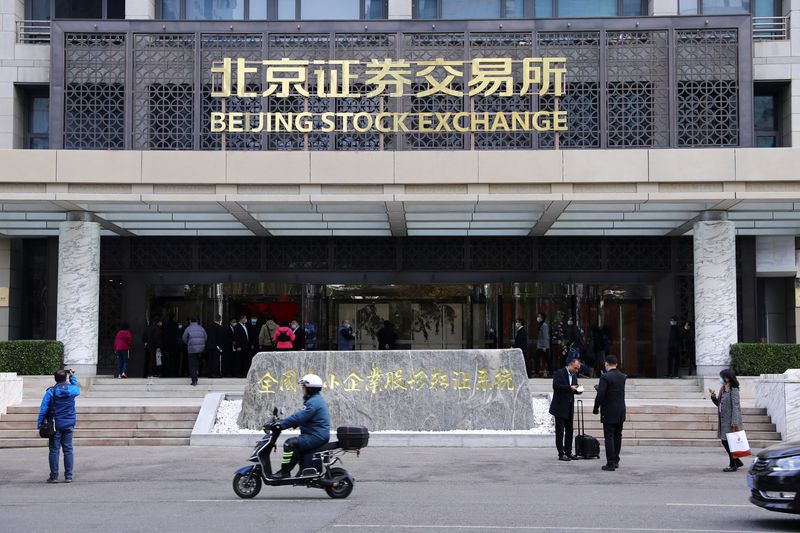By RaeWee
SINGAPORE (Reuters) – Global shares got off to a cautious start on Tuesday, while oil prices remained elevated as escalating conflict in the Middle East sapped risk appetite ahead of China's long-awaited reopening after a long holiday.
Ten-year U.S. Treasury yields held above 4% in early trading in Asia as a robust U.S. labor market prompted traders to sharply scale back expectations for interest rate cuts by the Federal Reserve. [US/]
Hezbollah fired rockets into Israel's third-largest city, Haifa, on Monday, and Israel appeared poised to expand its offensive into Lebanon, a year after the devastating Hamas attack on Israel that sparked the Gaza war.
On heightened fears of widespread conflict and supply disruptions, Brent crude futures rose above $80 a barrel for the first time in more than a month last session.
It last traded 0.09% higher at $81.00 per barrel, while U.S. crude futures rose 0.14% to $77.25 per barrel.
“The global benchmark reached USD80/bbl as expectations grew that Israel will target Iranian oil infrastructure in retaliation for a missile attack last week. President Biden's comments failed to allay these fears,” ANZ analysts said in a note.
“We still believe that a direct attack on Iranian oil facilities is Israel's least likely retaliation option.”
Still, the gloomy mood kept stocks tense on Tuesday.
MSCI's broadest index of Asia-Pacific shares outside Japan fell 0.05%, while Tokyo's Nikkei opened 0.79% lower.
S&P 500 futures gained 0.03%, while Nasdaq futures lost 0.01%.
But the cautious stock prices could change once Chinese markets reopen later in the day after a week-long holiday. Gains and volatility could be on the cards as Singapore-traded FTSE China A50 futures have risen about 14% since China's cash markets closed on September 30.
Hong Kong's Hang Seng China Enterprises index rose 11% in the same period, signaling a catch-up rally for the mainland.
Before the break, China announced its most aggressive stimulus measures since the pandemic, a move that sent the CSI300 up 25% in five sessions and sparked a rally in global stock markets.
The focus will also be on a press conference by the country's National Development and Reform Commission, scheduled for 0200 GMT, for further details around the stimulus pledges that fueled the market frenzy.
“Whether the outcome meets expectations will determine whether the Hong Kong market can rise further,” said Richard Tang, China strategist and Hong Kong head of research at Julius Baer.
“Foreign investors filled their positions last week, fueling a strong rally. The second leg of the rally is likely to be driven by buying in mainland China.”
FED BETTINGS
In the broader market, investors also considered the future path of the Fed's easing cycle in the wake of Friday's blockbuster US jobs report.
Any chance of another excessive 50 basis point rate cut next month has since disappeared and traders are even pricing in a 14.6% chance that the Fed can leave rates unchanged. By December, only 50 basis points of cuts will be priced in.
Reflecting the Fed's less aggressive easing expectations, two-year U.S. Treasury yields hovered near their highest levels in more than a month on Tuesday and were last at 3.9764%.
“While confidence on another 50 basis point cut has rightly been dampened… the Fed's rate-cutting cycle is far from being derailed,” said Vishnu Varathan, head of macro research for Asia ex-Japan at Mizuho Bank.
“Granted, the overall jobs report is a legitimate reason to reassess overzealous 'pivot bets' on front-loaded, outsize cuts.”
Still, the US dollar failed to further boost the Fed's revised expectations after already having a strong run last week, helped by safe-haven gains linked to the conflict in the Central East.
It trailed in early trading in Asia, falling 0.17% against the Japanese yen to 147.97, while sterling rose 0.03% to $1.3089.
Against a basket of currencies, the dollar fell 0.02% to 102.44, although it hovered near a seven-week high on Friday.
Elsewhere, spot gold was little changed at $2,643.33 an ounce. [GOL/]
(Reporting by Rae Wee; Editing by Shri Navaratnam)

